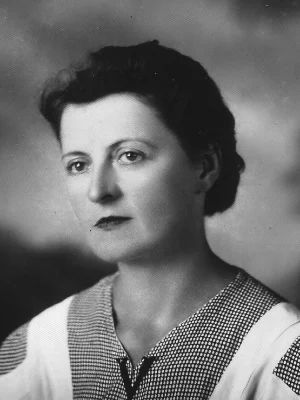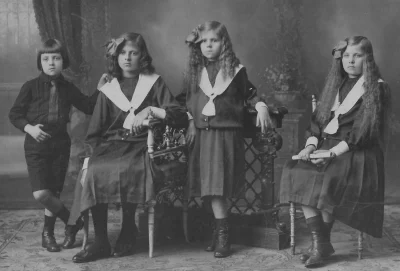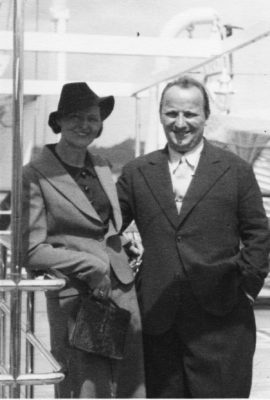Wanda Orla-Salmonowicz (1901–1988) was the wife of Bohdan Pawłowicz and mother of two children: Leszek Kazimierz and Hanna Antonina.
Family Background
Wanda was born in Curitiba, Brazil, on April 10th, 1901 as the daughter of Antonina Bohdanowicz (1876-1923) and Mieczysław Salmonowicz h. Orla (1863-1913), a chemical engineer. (pdf in Polish)
Antonina Bohdanowicz, Wanda’s mother, was the daughter of Paweł and Ewa Bohdanowicz, while Mieczysław, her father, was the only son of Władysław Medard Salmonowicz (1822-1865) and Konstancja Benisławska (1841-1892). (pdf in Polish).
Mieczysław was born on December 1st, 1863, on Raczuny Bujwidowskie (or simply Raczuny), a manor his mother had acquired in 1859, within the Polish-Lithuanian Commonwealth.
Following his mother’s demise from a heart attack in 1892, Mieczysław inherited the estate. He sold it in 1900 to emigrate with his wife to Curitiba, Paraná in Brazil, where they had their children: Wanda, born on April 10th, 1901, was the eldest of two sisters: Jadwiga (1902-1984) and Janina (1905-1984), and a brother, Iwo (1908-1923).
Despite his efforts to establish various businesses in Curitiba, including a glass factory in Antonina, misfortunes led to bankruptcy, culminating in his suicide in 1913. This left Antonina and their four children to fend for themselves. Antonina received then the support from the sisters of Saint Joseph. Tragically, she and her son Iwon passed away a month apart in 1923, most likely due to the Spanish influenza.
Brazil
Wanda graduated from Collegio São José in Curitiba, Paraná, in December 1919, and subsequently taught for some time at a primary school in Castro, Paraná, until 1920. From 1920 to 1921 she followed evening courses in shorthand and typing. Transitioning to administrative roles, she served as a secretary at the General Polish Consulate in Curitiba from 1920 to 1922, followed by employment at the Colletoria Estadual, the State Tax Office in Curitiba, until 1924.
In late 1923, she met and fell in love at first sight with Bohdan Pawłowicz at a party organized by the Polish Consulate for the Lwów crew. They got married three months after, on 19th January 1924 at the Santa Cândida church in Bacacheri, at the time, a Polish colony near Curitiba. Although Bohdan wanted her to embark back to Poland with him, the sisters of the orphanage house who had given support to her mother, did not let her go and made Bohdan promise to send them her ticket and his parents’ official acknowledgement agreement. He left in March 1924 and Wanda, in April, to reunite with her husband and his family at Kanonia 14 in Warsaw.
From then onwards, Wanda’s life took various turns across continents.
Poland
From 1924 to 1925 she studied Commercial Art at the Warsaw Academy of Fine Arts but stopped in June when her son Leszek Kazimierz was born in June 1925. The whole family then left the townhouse on Kanonia 14 and moved to the house on Gorazsewska 8, in the Czerniaków Garden City.
On a very cold 26th November in 1928 she gave birth to her daughter, Hanna Antonina (at the hospital, as her first childbirth had been at home and almost cost her life). When her daughter was about a year and a half old, Wanda embarked on a trip to Brazil to visit her two sisters and she left her children under the care of a nanny and her mother-in-law, Helena. What was to be a short trip abroad lasted more than a year – the Brazilian 1930 revolution started on October 3rd. Wanda was not allowed to leave the country and had to wait until the upheaval was over to go back. Upon her return, she found her daughter struggling to recognize her, a poignant consequence of their prolonged separation.
The family’s journey continued as they moved to Łódź in 1935, where Bohdan assumed the directorship of the Łódź Broadcast Station of the Polish Radio Co. Subsequently, they relocated to Toruń in 1937, where Bohdan took on the role of director of the newly established Polish Radio Broadcasting Station of Pomerania.
The family usually spent their summer vacations either in the mountains or at Willa Pawłowicz in Jastrzębia Góra, situated on the Baltic coast, where her father-in-law, Kazimierz, had built a house.
In late July 1939, while vacationing in the mountains with the children, she took some days to accompany Bohdan to Gdynia. There, he boarded the M/S Chrobry, to embark on the inaugural voyage of the first Polish transatlantic liner bound for South America. This marked the final time she saw her husband in Poland before their reunion four years later—in Brazil.
Their lives were further disrupted by the onset of World War II, navigating through tumultuous events and displacements.
World War II
By mid-August, she received a telephone call from Władysław Raczkiewicz, the Governor of Pomerania, who would later become the first Polish president in exile. He advised her to return home, pack, and leave town with the children due to the uncertain situation and the heightened risk of war. Given her husband’s status and activities, they were likely targets for arrest, deportation, or worse, as part of the Intelligenzaktion.
Wanda swiftly returned to Toruń with the children, packed essential belongings, and closed up their apartment, leaving it under the care of the servants with the intention of returning (although they left on August 30th, 1939, never to return). Attempting to join her mother-in-law, Helena, in Czerniaków, Warsaw, proved challenging due to overcrowded trains filled with soldiers. Eventually, she secured passage on a boat along the Vistula River, reaching her destination just a day before the declaration of war.
In the subsequent days, she coordinated with Krystyna, her sister-in-law married to Aleksander Hauke-Nowak, the governor of the Volhynia province. They arranged for their secretary Grzegosz fetch the family in their car and transport them to Lutsk (Łuck), then situated in the eastern part of Poland, which had not yet been occupied by German forces( Molotov-Ribbentrop Pact).
Their journey was fraught with danger as they traversed roads subjected to heavy bombing and shelling. They frequently halted to seek refuge, slowing their progress. The children vividly recalled the raids, the thunderous blasts, and the trembling houses. Later, they would learn that the attacks were due to the road also serving as an escape route for the Polish government in exile, who arrived in Łuck on September 7th.
When Wanda and the children finally arrived in Łuck, the Hauke-Nowaks were in the midst of preparing to evacuate to Kremenets (Krzemieniec). On September 14th, Aleksander joined the Polish Government in Exile on the Romanian border, while his wife Krystyna made her way out of Poland through the Baltic states. Before departing, however, they directed Wanda and her children to a nearby farm.
On September 17th, the Soviets invaded Poland, and the farm subsequently came under inspection by Russian army officers. The owners of the farm fled shortly after, taking all the horses but leaving behind one horse and a cart for Wanda and the children. Initially intending to drive the cart back to Warsaw, they were halted by the Soviet army on the road and directed to a detention camp on a potato plantation outside Równe. This camp served as a gathering point for those captured on the roads, destined for transportation to Russia. Throughout the night, the family reported hearing numerous gunshots echoing across the camp.
In a stroke of quick thinking, Wanda forbade the children to speak Polish and began conversing in Portuguese, waving the Brazilian papers adorned with numerous stamps. Unbeknownst to her, Brazil did not maintain diplomatic relations with Russia at that time. However, through her courage and the Brazilian passport, Wanda managed to convincingly persuade the camp supervisor that she and her children were Brazilian nationals and should not be detained. Her resolute demeanor led him to release them. Many prisoners took advantage of the opportunity to escape when the gates were opened to allow their passage.
Due to the horse’s exhaustion, Wanda instructed the children to take turns riding in the cart while she walked back to the vacant Nowak residence in Łuck, which had been taken over by Grzegorz, Aleksander’s driver and secretary. The family remained there for approximately a month, during which time Wanda recovered from a high fever induced by the blisters covering her feet and worked as a maid to pay for their stay. Two Russian soldiers were stationed at the house. The children recall observing them as they meticulously counted the buttons from army uniforms, which Polish soldiers had buried in the garden while changing into civilian attire to facilitate their escape under cover of darkness.
Wanda then decided to take the children back to Warsaw, to her mother-in-law’s house in Czerniaków. En route, she arranged with a Jewish couple to shelter them for the night and help them cross a river on a small boat in the early hours of the morning. They then crossed illegally the green frontier in Ustyluh (Uściług). They boarded trains filled with Polish soldiers heading west to join army units and civilians withdrawing from Soviet occupation. Arriving in Warsaw, they were greeted by scenes of devastation; the city had surrendered and was under German occupation. At the station, Wanda hired a cart and they drove to Czerniaków, unsure whether the house had survived the destruction. Upon arrival, they were relieved to find that only one of the front trees had been felled by bullets, and Helena J. Pawłowiczowa was there to provide shelter once more.
Hanna, who was 11 at the time, was enrolled in a nearby primary school in November. However, by then, the teaching of the Polish language and the history of Poland had already been prohibited. Leszek, aged 14, was on the brink of entering high school. Yet, due to the closure of most Polish educational institutions as part of policies aimed at cultural suppression, he had to turn to underground education and the Secret Teaching Organization network to continue his studies.
As Wanda observed the deteriorating situation, she grew increasingly concerned about the safety of her children, particularly Leszek, who faced the risk of being apprehended and sent to German labor camps. Being a Brazilian citizen by birth, she reached out to various contacts, went to the German headquarters in Krakow to have the permission to travel to the Brazilian Embassy in Berlin. The Brazilian consul issued her and her children a laissez-passer, giving them money, tickets to Genova and provided instructions so as to obtain the necessary documentation to exit the country. Wanda and her children departed from Genova, Italy and sailed to Brazil on the Vulcania, on May 2nd 1940.
Brazil
When Wanda arrived in Rio de Janeiro with her two children, she was received by her two sisters – Jadwiga and Janina, who lived there. They housed them temporarily in Rio, gave them clothes and made arrangements for them to live in Curitiba, Paraná.
Curitiba
Rio de Janeiro
U.S.A.
New York
Buffalo
Silver Spring
Final Years and Death
Wanda passed away in Santos, Brazil, due to complications arising from pancreatic cancer on February 7th, 1988.
Sources
Primary
Photographs, letters, work permit, diaries, family written and oral narratives, birth and death certificates.
Secondary
- Głuchowski, K. (1927). Materjały do Problemu Osadnictwa polskiego W Brazylji. Wydawn. Instytutu Naukowego do Badań Emigracji i Kolonizacji.
“rozdz. 7, str. 235: „(…) w 1900 roku [przybyli] bracia Suchorscy, M.[Mieczysław] Salmonowicz, W. Białynia-Kowerski, Artwiński, pani Jamna (…)” - Jankowski, C. (1857-1929). (2018, December 31). Powiat Oszmiański : Materjały do dziejów ziemi I Ludzi CZ. 1. Radom Digital Library. https://bc.radom.pl/dlibra/publication/40182/edition/38939/content Cz. 1 str 163 (on Raczuny)
- Warchałowski, S., Mazurek, J., & Jakubowska, Z. (2009). I poleciał W świat daleki–: Wspomnienia Z Brazylii, polski i Peru. Muzeum Historii Polskiego Ruchu Ludowego. str.58
D13-Władysław-Med.-s.-Izydora-D6 (pdf in Polish) from http://dwarody.pl/drzewo/
D19-Mieczysław-s.-Władysława-D13 (pdf in Polish) from http://dwarody.pl/drzewo/



